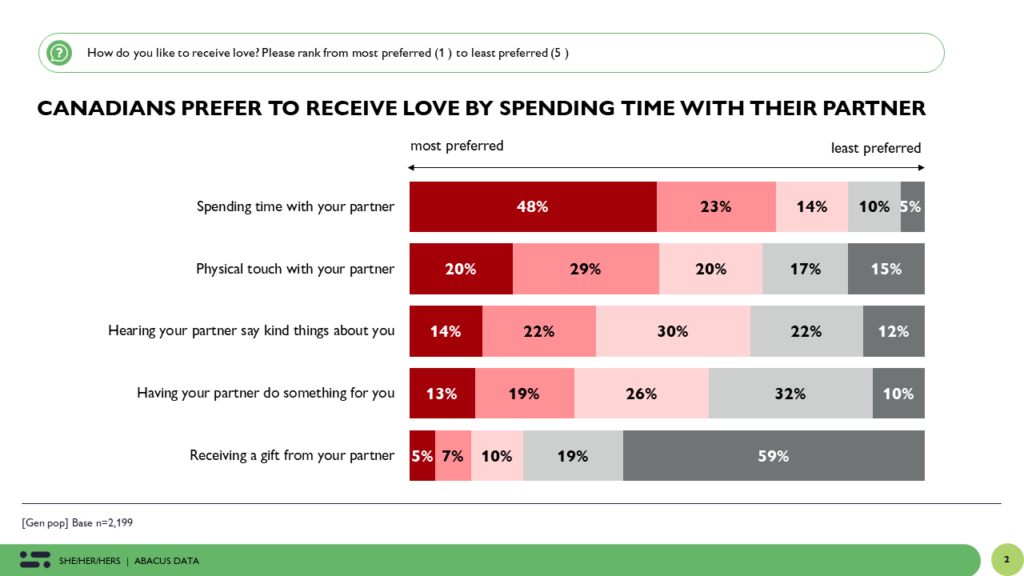Love and Relationships in 2024: Canadians and Valentine’s Day
February 9, 2024
It is already February 2024 and Valentine’s Day is right around the corner. As we do with many holidays, we fielded some questions on our latest omnibus survey about Valentine’s Day, with a focus on holiday plans and preferred love languages.
The data below is from a survey fielded from January 18th to 23rd 2024. The survey was paid for by Abacus Data.
Two-thirds of Canadian couples are celebrating Valentine’s Day this year, up five points from last year. Younger Canadians are far more likely to be celebrating the holidays this year, as are higher-income households. Celebrations look similar across party lines.

In other years we have asked Canadians about their Valentine’s Day plans, and relationship expectations. This year we were curious how Canadians feel about receiving love.
By a landslide, Canadians’ most preferred love language is spending time with their partner (48% say this is their top choice). This is followed by physical touch (20%), kind words (14%), acts of service (13%) and receiving gifts (5%).

Younger Canadians have a greater affinity for gifts than most, but it is still their least favourite way to receive love.
As may be expected, the differences are greatest between men and women. Men are more likely to prefer physical touch, while women are more likely to prefer kind words and acts of service.

Upshot
Despite cost of living concerns it seems that Canadians are making investments in their relationships and celebrating love. If you are still looking for ways to celebrate love with your partner this year, perhaps plan to spend some time together. Statistically speaking, that’s the best way to show them you care.
Methodology
The survey was conducted with 2,199 Canadian adults from January 18 to 23, 2024. A random sample of panelists were invited to complete the survey from a set of partner panels based on the Lucid exchange platform. These partners are typically double opt-in survey panels, blended to manage out potential skews in the data from a single source.
The margin of error for a comparable probability-based random sample of the same size is +/- 2.09%, 19 times out of 20.
The data were weighted according to census data to ensure that the sample matched Canada’s population according to age, gender, educational attainment, and region. Totals may not add up to 100 due to rounding.
This survey was paid for by Abacus Data Inc.
Abacus Data follows the CRIC Public Opinion Research Standards and Disclosure Requirements that can be found here: https://canadianresearchinsightscouncil.ca/standards/
About Abacus Data
We are the only research and strategy firm that helps organizations respond to the disruptive risks and opportunities in a world where demographics and technology are changing more quickly than ever.
We are an innovative, fast-growing public opinion and marketing research consultancy. We use the latest technology, sound science, and deep experience to generate top-flight research-based advice to our clients. We offer global research capacity with a strong focus on customer service, attention to detail, and exceptional value.
We were one of the most accurate pollsters conducting research during the 2021 Canadian election following up on our outstanding record in 2019.
Contact us with any questions.
Find out more about how we can help your organization by downloading our corporate profile and service offering.



